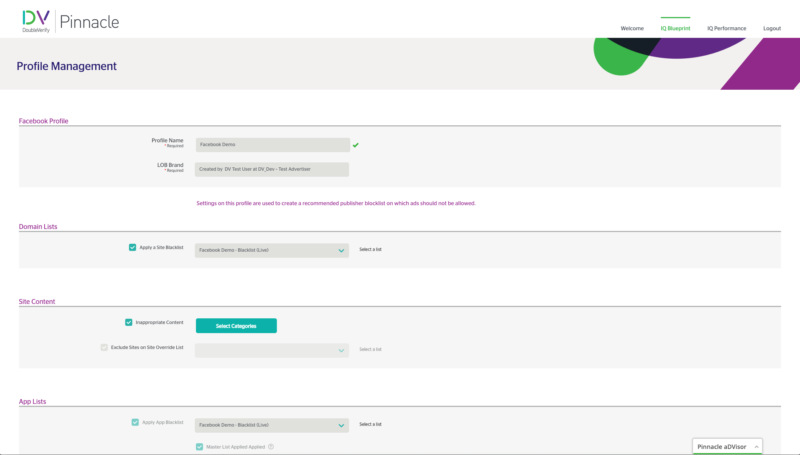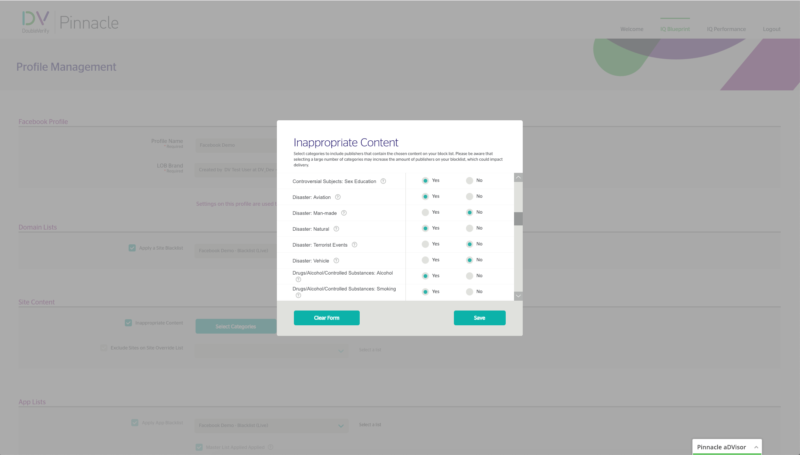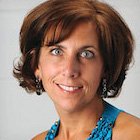Facebook launches brand safety certification program with DoubleVerify, OpenSlate as launch recipients
DoubleVerify and OpenSlate are the first ad tech companies to receive certification in Facebook's new brand safety program for marketing partners.

DoubleVerify’s brand safety tool set-up screen.
Facebook announced Thursday it is launching a brand safety certification program for Facebook Marketing Partners. The first companies to receive certification are DoubleVerify, an ad measurement platform, and OpenSlate, a video content rating platform for marketers — both of which are launching new Facebook brand safety tools.
Facebook’s brand safety certification. After more than a year of brand safety concerns, content policy updates and video metric missteps, Facebook is taking steps to create a safer environment for advertisers. Facebook has had brand safety controls in place for advertisers for some time, offering publisher lists and delivery reports listing where ads appear, and the ability to create block lists, but advertisers have been asking for third-party solutions to help manage brand safety on the platform.
The new brand safety certification program for Facebook Marketing Partners highlights companies that offer proprietary solutions to help Facebook advertisers review content options and control where their ads appear. To roll-out the program, Facebook announced DoubleVerify and OpenSlate as the first two Facebook Marketing Partners to receive certification in connection to the new brand safety tools each company is releasing.
DoubleVerify’s brand safety tool. DoubleVerify has been part of the Facebook Marketing Program since 2017, offering advertisers a measurement platform to track viewability and monitor ad fraud. The company announced Thursday a new proprietary brand safety tool that will work through a Facebook API, monitoring Facebook in-stream video inventory, Instant Articles and Audience Network content. DoubleVerify’s brand safety tool will update block lists daily and automate brand safety controls.
“Protecting brand reputation is critical for large digital advertisers. We share Facebook’s commitment to maintain a trusted and transparent marketplace, and we’re excited about this new initiative,” said DoubleVerify CEO Wayne Gattinella.
Below is a screenshot showing how advertisers choose what content they want to block their ads from appearing next to through DoubleVerify’s tool.


OpenSlate’s brand safety tool. OpenSlate, an independent analytics and ratings platform for digital video content, also received Facebook’s brand safety certification in connection with the brand safety tool it launched Thursday. The company says it will deliver “safety and suitability assessments” for 100 percent of Facebook’s in-stream ad-supported content, preemptively exclude brand-safety content via dynamic block lists, along with data and tools to automate Facebook’s block lists.
“The scale and diversity of monetized content on Facebook has grown exponentially on Facebook and so has the opportunity to build brands there. By extending our years of social video data science onto Facebook, we’re giving brands the critical third party data and tools to take advantage of the opportunity,” said OpenSlate CEO Mike Henry.
OpenSlate’s tool will also update block lists daily. The company says it ingests and analyzes data about every video on all ad-supported Facebook Pages and updates that data daily.
Why you should care. Facebook is doing everything it can to push more video to its users. The company has spent much time and effort to prop up Watch, its video viewing platform which was rolled out globally on desktop in December. At the same time, it expanded in-stream video ad breaks to 14 more markets. More video ad inventory on Facebook translates to more brand safety concerns for advertisers. Having access to third-party tools beyond Facebook’s controls offers marketers an added level of security to keep their brand away from abusive content that continues to plague the platform.
This story first appeared on Marketing Land. For more on digital marketing, click here.
Opinions expressed in this article are those of the guest author and not necessarily MarTech. Staff authors are listed here.
Related stories
